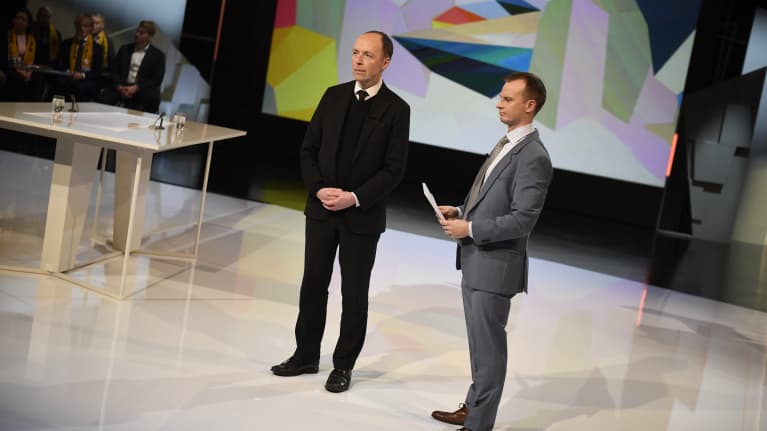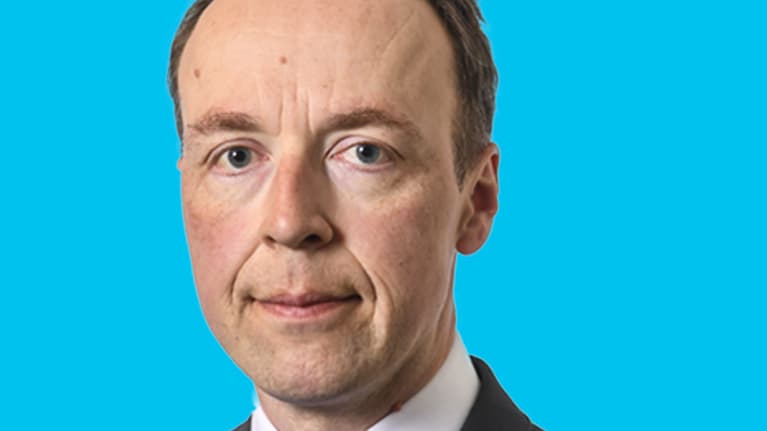For more than two decades, ex-Finns Party chair Jussi Halla-aho has been one of Finland's harshest immigration critics, earning a hate-speech conviction for blog posts that attacked Somalis and Islam as well as garnering support from voters opposed to immigration and multiculturalism.
Rather than whipping up crowds with fiery speeches, this bookish politician delivered his message in a blog titled "Scripta: Writings from the sinking west" and is known to conduct interviews in a dry, deadpan voice.
While Halla-aho has a fervent following among some radical right voters, his big challenge is in forming the broad coalition of voters needed to advance into the second round of the presidential election.
His background as a blogger is both his strength and his weakness. The blog, Scripta, created an online community of readers willing to flirt with racism and far-right ideology who christened Halla-aho "Mestari" ("Master"), propelling him into politics.
He became Speaker of Parliament, a post traditionally controlled by the second-largest party, after last April's parliamentary election. The new right-wing government however faced a tough first few weeks in office, with its future looking uncertain after extremist social media posts by Finns Party ministers, including his successor as party leader Riikka Purra, came to light.
Opposition MPs demanded that Parliament return from its summer recess to hold confidence votes on Purra and the cabinet. Halla-aho declined to recall the legislature, sparking allegations of bias.
By September, after Parliament reconvened, tempers had cooled, semi-apologies were issued, and the cabinet survived the confidence votes.
This is part of a series of profiles on candidates in the presidential election. Our really simple guide provides some essential information about the race to become Finland's next president.
Becoming Finns Party leader
A eurosceptic, in 2014 Halla-aho joined the European Parliament where he forged links with like-minded populists in Italy's League and Germany's AfD.
He returned to domestic politics with a bang in 2017 by winning the leadership of the Finns Party, then in its first government term, at a dramatic party congress. The victory signified a shift in power as supporters of Timo Soini, the outgoing leader, lost out to more radical elements in the party.
That triggered a political earthquake as PM Juha Sipilä (Cen) and then-finance minister Petteri Orpo (NCP) refused to carry on in partnership with a party led by the firebrand Halla-aho.
Moderate members of the party formed a new group that continued in government, but lost all their seats in the next election. Halla-aho's immigration hardliners emerged triumphant, becoming the number-two party in Parliament in 2019, a status they've held ever since.
Warnings about Russia and support for Ukraine
Some of Halla-aho's warnings about Russia now seem prescient.
In 2004, he described Russia as "thoroughly corrupt," veering toward totalitarianism and controlled by "KGB butchers" — a view that at the time seemed extreme in Finland, when trade with its eastern neighbour was seen as crucial.
In 2019, Halla-aho warned against building the Nord Stream gas pipelines, saying they would give Putin "a political lever" to apply pressure on Europe — a statement which was scoffed at by former SDP chair Eero Heinäluoma and others. He also supported Finnish membership of Nato when that was an unpopular view in Finns Party circles.

As chair of parliament's Foreign Affairs Committee, he has taken a strongly pro-Ukrainian stance and frequently posts about the topic.
He is fluent in Ukrainian after a spell working in the consular section of Finland's embassy in Kyiv in the 1990s, and last November he delivered a lengthy speech in Ukrainian to the Parliament in Kyiv after Ukrainian President Volodymyr Zelensky presented him with a medal to thank him for his support.
Church Slavonic and the metal years
Halla-aho, 52, sang and played guitar in a speed-metal band called Blashemia into his early 20s.
Last November, Halla-aho indicated that his musical taste hasn't changed much in a rare light-hearted media appearance on the Yle TV programme Elämäni biisi ("Song of My Life") with other presidential candidates. When asked to pick a song to describe his presidency, he chose "Resist and Bite" by Swedish power metal band Sabaton ("we take up arms and fight!/Fight hard, resist and do what's right!").
However, like Greens presidential candidate Pekka Haavisto, young Halla-aho did not take up arms. He declined military conscription and opted for civilian service instead, a decision he later described as "stupid".
In 1995 he started studying Russian at the University of Helsinki, later working there as a researcher and teacher.
According to an unauthorised biography by Iltalehti journalist Jussi Nurmi, Halla-aho's racist blog posts raised concerns at the university, and he was repeatedly warned about them before his contract was discontinued in 2006. That year he earned a doctoral degree with a dissertation on Old Church Slavonic.
The Wednesday evening club
In the early 2000s, he was a leader of the far-right nationalist group Suomen Sisu, which also included Nazi sympathisers.
Halla-aho, who has dismissed the Holocaust as a "historical curiosity," led its Wednesday evening events at a pub in Helsinki's Punavuori neighbourhood. It was at these meetings where Purra says she experienced her right-wing political awakening.
Around that time, his Scripta blog — one of Finland's most widely read — featured Halla-aho and Purra's most incendiary comments about immigrants and other minorities.
In 2003, he wrote that he had considered shooting a gay man, adding that "violence is an underrated way of solving problems."
Three years later he suggested that Finnish women who support multiculturalism would "get what they ask for" by being raped by immigrants.
The Supreme Court convicted Halla-aho of ethnic agitation and disturbing religious worship over his blog posts about immigrants and Islam. He was ordered to remove some old posts, but never apologised for them, saying only that he would not have published such comments as an elected politician.
Recently Halla-aho said he was "not worried" about a possible Donald Trump re-election, placing him in a small minority among Finnish people.
Paradoxically, this detached, soft-spoken urban academic remains highly popular among people who are seemingly quite different from him in rural Finland. It remains to be seen whether he can expand that base of support, or whether he simply sees the election as another soapbox to express views that once seemed fringe but have become increasingly mainstream in Finland.
Yle's presidential election compass offers a viewpoint on how the candidates line up on various issues. The compass is available in English here.
Users with an Yle ID can leave comments on our news stories. You can create your Yle ID via this link. Our guidelines on commenting and moderation are explained here.
